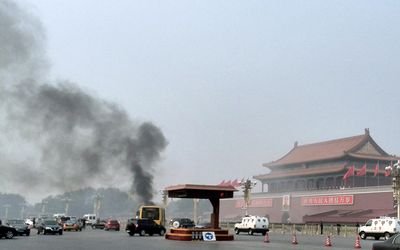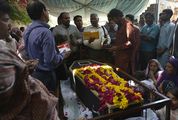China treating Tiananmen crash as possible suicide attack
by Benjamin Kang Lim and Ben Blanchard,
2013-10-30 10:23:52.0
BEIJING — Chinese authorities investigating what could be Beijing’s first major suicide attack searched on Tuesday for two men from Muslim-dominated Xinjiang after three people suspected to be from the restive region drove a sport utility vehicle into a crowd at Tiananmen Square and set it on fire.
They killed themselves and two tourists on Monday in the square, the heart of China’s power structure and the focal point of the mass 1989 pro-democracy demonstrations brutally crushed by the military.
Police have spread a dragnet across the capital, checking hotels and vehicles, seeking two people suspected to be ethnic Uighurs — a Muslim minority from Xinjiang in China’s far west, on the borders of former Soviet Central Asia.
Two senior sources said on Tuesday the crash, which also injured 38 bystanders at perhaps the most closely guarded location in China, was suspected of being a suicide attack carried out by people from Xinjiang. It was initially believed to be an accident.
The sources did not specifically say the occupants were Uighurs, many of whom chafe at Chinese controls on their culture and religion.
"It looks like a premeditated suicide attack," said a source with direct knowledge of the matter, speaking on condition of anonymity to avoid repercussions for talking to the foreign media.
There have been suicide bombings before in China, and in Beijing, mostly by people with personal grievances, but none has targeted the very heart of China’s government like this appears to have.
China has blamed Uighur separatists and religious extremists for a series of attacks in Xinjiang, saying they want to establish an independent state called East Turkestan. Rights groups and exiles say China massively overstates the threat.
In 2009, nearly 200 people were killed in clashes between Uighurs and ethnic Chinese in Urumqi, the capital of Xinjiang.
But the unrest has never before spilled over into China’s capital despite speculation in 1997 that Uighurs were to blame for a Beijing bus bomb that killed at least two people.
Uighurs are also not known to have previously carried out suicide attacks.
Exiled Uighur leader Rebiya Kadeer, who is based in Washington, said she was worried that Monday’s crash would bring a fierce crackdown on her people.
Ms Kadeer, who left China in 2005, heads an international Uighur exile organisation called the World Uighur Congress, based in Germany.
Her group urged calm and voiced concern that Chinese censorship would stop facts from coming out.
"The Chinese government will not hesitate to concoct a version of the incident in Beijing so as to further impose repressive measures on the Uighur people," she said.
Ms Kadeer said China had used the international fight against terrorism launched after the September 11 2001 attacks on the US as a pretext for a crackdown on the Uighurs in Xinjiang.
"There is no sign we will see anything different this time, even though evidence of what really happened yesterday is thin on the ground," she said.
‘No accident’
China’s government has given no official word on whether the incident was an accident or an attack. State media have mostly kept to reporting brief statements from the police and official Xinhua news agency giving a bare-bones account of what happened, as is common for such sensitive events.
Police are still investigating and have yet to determine the identities of the three people in the sport utility vehicle but suspect they are from Xinjiang, according to the sources. The other dead were a Chinese man and a woman from the Philippines, both tourists.
However, Beijing police said late on Monday they were looking for two suspects from Xinjiang in connection with a "major incident".
The sources said the occupants of the vehicle were suspected of lighting a flammable substance in the vehicle.
"It was no accident. The jeep knocked down barricades and rammed into pedestrians. The three men had no plans to flee from the scene," said a source with ties to the leadership.
A Reuters news agency reporter at the scene at the time said he did not hear any gunshots.
On Monday night, hours after the fire, Beijing police issued a notice asking local hotels about suspicious guests who had checked in since October 1 and named two suspects it said were from Xinjiang. Four hotels told Reuters they had received the notice.
Calls to the Xinjiang government went unanswered.
China denies mistreating any of its minority groups, saying they are guaranteed wide-ranging religious and cultural freedoms.
Many rights groups say China has overplayed the threat posed to justify its tough controls in energy-rich Xinjiang, which lies strategically on the borders of Central Asia, India and Pakistan.
Reuters

Smoke raises in front of a portrait of late Chinese Chairman Mao Zedong at Tiananmen Square in Beijing on Monday after a car ploughed into pedestrians and caught fire. Picture: REUTERS
BEIJING — Chinese authorities investigating what could be Beijing’s first major suicide attack searched on Tuesday for two men from Muslim-dominated Xinjiang after three people suspected to be from the restive region drove a sport utility vehicle into a crowd at Tiananmen Square and set it on fire.
They killed themselves and two tourists on Monday in the square, the heart of China’s power structure and the focal point of the mass 1989 pro-democracy demonstrations brutally crushed by the military.
Police have spread a dragnet across the capital, checking hotels and vehicles, seeking two people suspected to be ethnic Uighurs — a Muslim minority from Xinjiang in China’s far west, on the borders of former Soviet Central Asia.
Two senior sources said on Tuesday the crash, which also injured 38 bystanders at perhaps the most closely guarded location in China, was suspected of being a suicide attack carried out by people from Xinjiang. It was initially believed to be an accident.
The sources did not specifically say the occupants were Uighurs, many of whom chafe at Chinese controls on their culture and religion.
"It looks like a premeditated suicide attack," said a source with direct knowledge of the matter, speaking on condition of anonymity to avoid repercussions for talking to the foreign media.
There have been suicide bombings before in China, and in Beijing, mostly by people with personal grievances, but none has targeted the very heart of China’s government like this appears to have.
China has blamed Uighur separatists and religious extremists for a series of attacks in Xinjiang, saying they want to establish an independent state called East Turkestan. Rights groups and exiles say China massively overstates the threat.
In 2009, nearly 200 people were killed in clashes between Uighurs and ethnic Chinese in Urumqi, the capital of Xinjiang.
But the unrest has never before spilled over into China’s capital despite speculation in 1997 that Uighurs were to blame for a Beijing bus bomb that killed at least two people.
Uighurs are also not known to have previously carried out suicide attacks.
Exiled Uighur leader Rebiya Kadeer, who is based in Washington, said she was worried that Monday’s crash would bring a fierce crackdown on her people.
Ms Kadeer, who left China in 2005, heads an international Uighur exile organisation called the World Uighur Congress, based in Germany.
Her group urged calm and voiced concern that Chinese censorship would stop facts from coming out.
"The Chinese government will not hesitate to concoct a version of the incident in Beijing so as to further impose repressive measures on the Uighur people," she said.
Ms Kadeer said China had used the international fight against terrorism launched after the September 11 2001 attacks on the US as a pretext for a crackdown on the Uighurs in Xinjiang.
"There is no sign we will see anything different this time, even though evidence of what really happened yesterday is thin on the ground," she said.
‘No accident’
China’s government has given no official word on whether the incident was an accident or an attack. State media have mostly kept to reporting brief statements from the police and official Xinhua news agency giving a bare-bones account of what happened, as is common for such sensitive events.
Police are still investigating and have yet to determine the identities of the three people in the sport utility vehicle but suspect they are from Xinjiang, according to the sources. The other dead were a Chinese man and a woman from the Philippines, both tourists.
However, Beijing police said late on Monday they were looking for two suspects from Xinjiang in connection with a "major incident".
The sources said the occupants of the vehicle were suspected of lighting a flammable substance in the vehicle.
"It was no accident. The jeep knocked down barricades and rammed into pedestrians. The three men had no plans to flee from the scene," said a source with ties to the leadership.
A Reuters news agency reporter at the scene at the time said he did not hear any gunshots.
On Monday night, hours after the fire, Beijing police issued a notice asking local hotels about suspicious guests who had checked in since October 1 and named two suspects it said were from Xinjiang. Four hotels told Reuters they had received the notice.
Calls to the Xinjiang government went unanswered.
China denies mistreating any of its minority groups, saying they are guaranteed wide-ranging religious and cultural freedoms.
Many rights groups say China has overplayed the threat posed to justify its tough controls in energy-rich Xinjiang, which lies strategically on the borders of Central Asia, India and Pakistan.
Reuters




















Change: -0.47%
Change: -0.57%
Change: -1.76%
Change: -0.34%
Change: 0.02%
Data supplied by Profile Data
Change: -1.49%
Change: -0.04%
Change: -0.47%
Change: 0.00%
Change: 0.08%
Data supplied by Profile Data
Change: 0.36%
Change: 0.61%
Change: 0.12%
Change: -0.29%
Change: 0.82%
Data supplied by Profile Data
Change: 0.28%
Change: -0.42%
Change: 0.20%
Change: -1.57%
Change: -0.96%
Data supplied by Profile Data